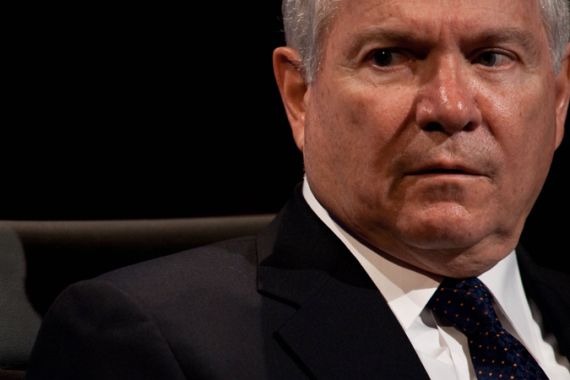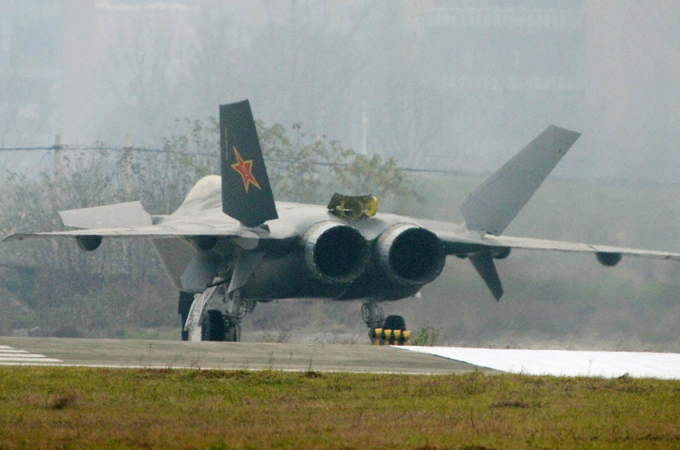US to respond to Chinese advances
Defence secretary Gates says Chinese military advances could undermine American military capabilities in the Pacific.

 |
| This image shows what is reported to be a Chinese stealth fighter, in Chengdu, Sichuan province [Reuters] |
The United States will enhance its military capabilities in response to Chinese advances in military technology, US defence secretary Robert Gates says.
He made the comments while en route to China’s capital Beijing, where he arrived on Sunday for talks with Chinese political and military leaders.
As its economy booms, China has made significant investments in its military, and its faster-than-expected advances in ballistic missile technology, combat aircraft and other strategic programs have raised eyebrows among many, particularly in the US.
Gates said some of China’s advances, if confirmed, could eventually undermine US military capabilities in the Pacific region.
“They clearly have the potential to put some of our capabilities at risk and we have to pay attention to them. We have to respond appropriately with our own programs,” Gates told reporters on board a US military plane.
“My hope is that through the strategic dialogue that I’m talking about, that maybe the need for some of these capabilities is reduced.”
Gates cited plans in the Pentagon’s five-year budget outline, which was released on Thursday, as examples of how the US could maintain its military edge.
These plans include funding for a new generation of long-range nuclear bombers, new electronic jammers and radar and new satellite launch technology.
Lawmakers in the US congress have criticised the budget outline, however, citing $78bn in overall defence spending cuts as a sign that military development would be underfunded.
Chinese advances
US officials have taken note of disclosures in recent weeks of advances in China’s capabilities, including its anti-ship ballistic missile program, which could challenge US aircraft carriers in the Pacific.
“I’ve been concerned about the development of the anti-ship cruise and ballistic missiles ever since I took this job,” Gates said. He added that China appeared “fairly far along” with its anti-ship ballistic missile but he said he did not know if it was operational yet.
China has made advances in other areas as well, and may be ready to launch its first aircraft carrier in 2011. New photographs indicate that the country may also have a prototype of a stealth fighter jet, named the J-20.
While he acknowledged that development of the stealth fighter was further along than expected by US intelligence estimates, Gates expressed scepticism at the stealth capability of the Chinese aircraft.
Improving relations
The stated goal of Gates’ January 9-12 trip to China is to improve relations with China’s military. US and Chinese military ties were suspended through most of 2010 after US President Barack Obama’s proposed arms sale to Taiwan drew Chinese ire.
Gates’ trip to the country is the most visible demonstration that the relations are now normalising.
He said that he does not expect any “dramatic breakthrough” during the visit, adding that improvements are likely to be gradual.
“I think this is evolutionary, particularly the military to military side,” Gates said.
“So rather than something dramatic, some kind of dramatic breakthrough, I think just getting some things started would be a positive outcome,” he added, after having spoken at length about ways the US and China could improve dialogue.
Gates’ visit comes a week before Chinese president Hu Jintao’s state visit to Washington, creating diplomatic momentum that US officials hope will allow the US defence secretary to make headway on sticky security issues.
“I think the Chinese’s clear desire that I come first, come to China before President Hu goes to Washington, was an indication of their interest in strengthening this part of the relationship,” Gates said.
He also praised China’s efforts to reduce tensions on the Korean peninsula. As North Korea’s main diplomatic and economic backer, China has been under pressure to rein in Pyongyang after the sinking of a South Korean warship and shelling of a South Korean island last year.
North Korea has denied that it was involved in the sinking of the warship.
“We recognise that China played a constructive role in lessening tensions on the peninsula in the latter part of last year,” he said.